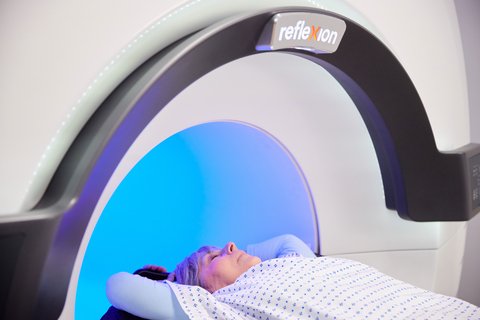CMS Grants Favorable Reimbursement for RefleXion’s SCINTIX Therapy
16 January 2024 | Tuesday | News

Image Source : Public Domain
The CMS has established a national payment rate for RefleXion's SCINTIX® biology-guided radiotherapy using CMS' New Technology Ambulatory Payment Classification pathway, reserved for new procedures not represented in existing reimbursement claims data. The new codes and payment are expected to facilitate clinical adoption of the novel cancer treatment option
RefleXion Medical, Inc., a therapeutic oncology company, today announced that the Centers for Medicare and Medicaid Services (CMS) has established a national payment rate for RefleXion’s SCINTIX® biology-guided radiotherapy using CMS’ New Technology (NT) Ambulatory Payment Classification (APC) pathway. This pathway is reserved for novel procedures that are not represented in the existing reimbursement claims data used to describe new procedures and their associated resources.
“This is the most positive change in radiotherapy reimbursement in nearly 20 years and translates into a significant win for cancer patients,” said Todd Powell, CEO and president of RefleXion Medical. “As with all new technologies, there is a learning curve for clinicians, and it is crucial that this is accounted for in procedural payment rates. Without accretive payment for technology innovation, it is challenging for providers to adopt novel treatment options.
“We are grateful that CMS recognizes the potential of our SCINTIX therapy for patients with all stages of indicated cancers and, with this decision, has addressed provider payment as a barrier to clinical adoption,” continued Powell.
The NT APC process evaluates several criteria aimed at determining whether a technology is truly new. The most important criterion is whether the new procedure can be described using an existing reimbursement code or a combination of codes. Other technologies use anatomical images to guide radiotherapy delivery; however, SCINTIX therapy is the only radiotherapy to use emissions from cancer cells, created by injecting the patient with a radiopharmaceutical, to deliver a radiation dose that continuously and autonomously targets the cancer itself.
CMS created two new reimbursement codes for use in the hospital outpatient setting, effective Jan. 1, 2024, to describe SCINTIX therapy. The first code, C9794, defines a separate pre-treatment procedure in which radiopharmaceutical emissions data is collected for use in creating the SCINTIX treatment delivery plan. The second code, C9795, is for the actual delivery of the SCINTIX treatment plan and is billed after each treatment session. The creation of these two codes acknowledges that SCINTIX is a revolutionary approach to treating cancer patients. Both codes are expected to retain NT APC status for two to three years while CMS collects procedural cost data to develop payment rates based on actual usage at RefleXion clinical sites across the U.S.
SCINTIX therapy is the only radiotherapy with the potential to overcome the hurdles of targeting and motion management, especially for multiple tumors, the core challenge in existing external beam radiotherapy approaches. Designated by the U.S. Food and Drug Administration (FDA) as a Breakthrough Device in 2021 for its potential in managing motion in lung tumors, SCINTIX therapy was FDA-cleared in 2023 for treating lung and bone tumors that arise from primary or metastatic disease. Patient treatments also began at several clinical sites in 2023. These milestones usher in a new era of autonomous radiotherapy where the biology of the tumor directs where to deliver the radiation dose.
Most Read
- Innovations In Magnetic Resonance Imaging Introduced By United Imaging
- Management of Relapsed/Refractory Multiple Myeloma
- 2025 Drug Approvals, Decoded: What Every Biopharma Leader Needs to Know
- BioPharma Manufacturing Resilience: Lessons From Capacity Expansion and Supply Chain Resets from 2025
- APAC Biopharma Review 2025: Innovation, Investment, and Influence on the Global Stage
- Top 25 Biotech Innovations Redefining Health And Planet In 2025
- How Health Systems Are Reshaping Drug Adoption, Partner Models, and Market Access in 2026
- The New AI Gold Rush: Western Pharma’s Billion-Dollar Bet on Chinese Biotech
- Single-Use Systems Are Rewiring Biopharma Manufacturing
- The State of Biotech and Life Science Jobs in Asia Pacific – 2025
- Asia-Pacific Leads the Charge: Latest Global BioSupplier Technologies of 2025
- Invisible Threats, Visible Risks: How the Nitrosamine Crisis Reshaped Asia’s Pharmaceutical Quality Landscape
Bio Jobs
- The State of Biotech and Life Science Jobs in Asia Pacific – 2025
- Avantor’s New CEO Ligner Aims to Unlock Global Potential and Deliver Shareholder Value
- AstraZeneca Commits $50 Billion to U.S. Expansion by 2030 in Biggest-Ever Global Investment
- Thermo Fisher, SAMRC, and South Africa’s Department of Science and Innovation Launch CATIR to Nurture Next-Gen Scientists
- Cube Biotech Appoints Former Sartorius CEO Dr. Joachim Kreuzburg to Board of Directors
- FDA’s AI Transition Marks a Turning Point in Drug Review: Industry Faces Pressure to Adapt Amid 20% Workforce Cut
- WuXi XDC Completes Mechanical Build of Singapore Bioconjugate Manufacturing Hub
News
Editor Picks











